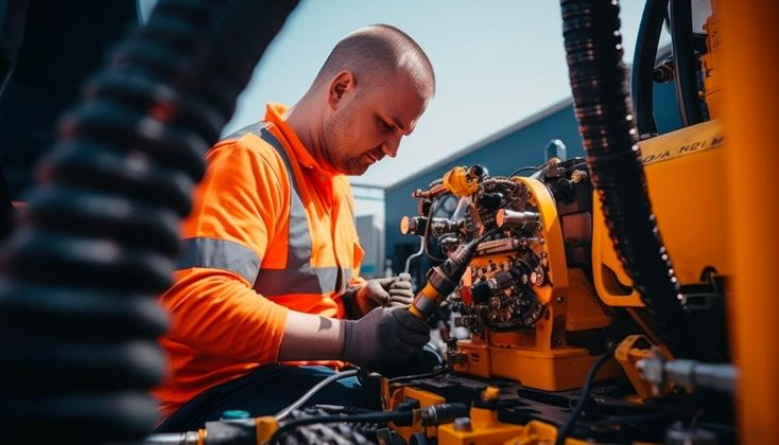
Hydraulic systems are the powerhouse behind heavy-duty machinery, enabling smooth, precise, and reliable movement for demanding tasks. In industries such as construction, mining, agriculture, and materials handling, hydraulics control the lifting, pushing, digging, and clamping operations that keep production moving. When these systems fail, the consequences are more than just inconvenient, they can be financially devastating. Downtime not only disrupts operations but also drives up repair costs, delays projects, and reduces overall profitability.
Investing in proper hydraulic repair and maintenance is not a luxury, it’s an operational necessity. High-performing hydraulics deliver consistent force, maintain operational safety, and extend the lifespan of your equipment, ensuring your business remains productive and competitive.
Why Hydraulic Systems Are Essential for Heavy Equipment
Heavy equipment is designed for one purpose: to perform tasks that require enormous force, precision, and reliability. The hydraulic system is the core mechanism that allows these machines to execute their duties effectively. Without a fully functional hydraulic system, loaders cannot lift, excavators cannot dig, and forklifts cannot operate efficiently.
Hydraulic systems operate under extreme pressure, often in harsh environmental conditions such as heat, dust, moisture, and vibration. Over time, these factors cause wear and tear on seals, hoses, pumps, and cylinders. When ignored, these small issues can escalate into major mechanical failures that bring your equipment, and your workflow, to a standstill.
Common Causes of Hydraulic System Failures
Hydraulic breakdowns rarely happen without warning. They are often the result of gradual deterioration or poor upkeep. Key causes include:
- Seal wear and degradation due to constant high pressure and temperature changes
- Contamination from dirt, water, or degraded hydraulic fluid
- Overloading the equipment beyond its designed capacity
- Poor installation or misalignment of hoses and fittings
- Lack of preventative maintenance checks and lubrication schedules
The Financial Impact of Ignoring Hydraulic Repairs
A neglected hydraulic system can quickly become a financial burden. A single pump replacement can cost tens of thousands, and if a failure occurs mid-project, additional expenses like emergency service fees, replacement rentals, and extended labour hours quickly add up. Beyond direct costs, project delays can affect client relationships, contracts, and future business opportunities.
Benefits of Timely Hydraulic Repairs and Maintenance
Choosing to address hydraulic issues proactively offers multiple long-term benefits:
- Extended Equipment Life: Prevents small issues from developing into expensive mechanical breakdowns.
- Improved Performance: Keeps force and responsiveness consistent under heavy loads.
- Reduced Downtime: Minimises production delays caused by mechanical failure.
- Lower Operating Costs: Avoids the inflated expenses associated with emergency repairs.
- Enhanced Workplace Safety: Reduces the risk of accidents linked to hydraulic malfunctions.
Best Practices for Maintaining Hydraulic Systems
A disciplined maintenance approach is essential to maximise the performance of your hydraulic systems:
- Use only manufacturer-recommended hydraulic oil grades and keep fluids clean.
- Replace seals, rods, and pistons at the first sign of wear or leakage.
- Secure hydraulic hoses to prevent rubbing, bending, or vibration stress.
- Keep filters clean and replace them on schedule to prevent contamination damage.
- Schedule regular inspections and document findings to monitor trends over time.
- Train operators on proper equipment handling to reduce strain on hydraulic components.
Why Aftermarket Hydraulic Parts Make Sense
Many businesses are discovering the advantages of using quality aftermarket parts for hydraulic repairs. These parts can match or exceed OEM specifications while offering significant cost savings. With access to a reliable aftermarket supplier, you gain consistent availability of components, reduced lead times, and competitive pricing without compromising durability or performance.
Why Choose After Market Commercial Solutions for Hydraulic Repairs
After Market Commercial Solutions offers an extensive range of hydraulic repair services and replacement parts that meet the demanding requirements of heavy-duty industries. Their commitment to quality and efficiency ensures:
- Access to high-performance OEM-equivalent and aftermarket hydraulic components
- Experienced technicians who understand the challenges of heavy machinery
- Fast turnaround to minimise downtime and keep projects on track
- Solutions tailored to the specific requirements of your equipment and operational conditions
“Keep your machines moving with hydraulics built to last.”